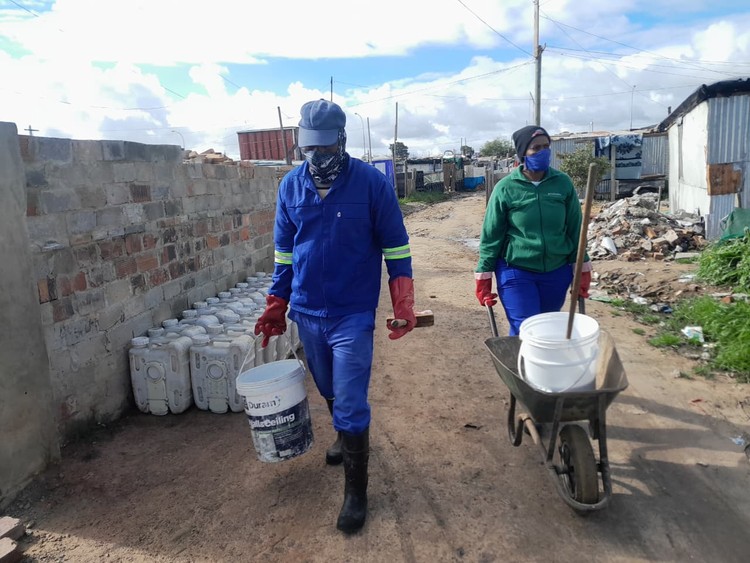
23 October 2025
Anele Mbasa and Mantsho Dieke have to fetch their own water to clean toilets in Covid informal settlement in Cape Town. Photo: Vincent Lali
Janitors in Covid informal settlement in Cape Town say they have to fetch their own water - and to pay for it - to clean the toilets they are employed to keep clean.
Janitor Mantsho Dieke said she and colleague Anele Mabasa have to beg for water in nearby Wallacedene and in Raceway informal settlement. She uses her own wheelbarrow to take the water to Covid and clean the toilets, she said.
Their employer, Mshengu Toilet Hire, which is contracted to the City of Cape Town, does not provide water and there is none in the informal settlement, she said.
Shack dwellers who have water taps inside their yards and shacks charge her and Mabasa R5 or R10 for water, Diekle said. “We pay for the water out of our own pockets because we want to keep our jobs.”
Dieke said she spends around R200 on water monthly. “If the water was freely available, I would use the money to buy food for my kids.”
“I don’t want to lose my job simply because I have no water. Besides, the cleaning company checks if we work,’’ she said.
Mbasa said some shack dwellers remove their taps to prevent the janitors from fetching water. ‘’The residents say they put together money to install their tap, so we must not use it because we never contributed money for it,’’ he said.
“You need a lot of water after a drunk resident shits on a toilet seat and after weekends when the toilets are dirty,’’ said Mbasa.
Community leader Lindelwa Mavata confirmed that families with water taps sold water to the janitors. “The residents say they spent money to install their own taps,’’ she said.
Acting mayco member for Water and Sanitation Siseko Mbandezi told GroundUp on 21 October that though the contract for toilet cleaning did not require the contractor to supply water, the City had engaged with the contractor and the contractor had confirmed that it was now providing water to the janitors.
Mshengu manager Benjamin Milandou-Loukeba said the City should not blame Mshengu because the contract did not say the company had to supply the janitors with water. He said community leaders were using the issue to prompt the City to install water in the informal settlements.
“Water tanker deliveries to the settlement have been reinstated twice a week,” said Mbandezi. “Additionally, the contractor has been instructed to provide janitors with water for cleaning on days when the water tanker is not scheduled.”
But when GroundUp checked with Mbasa on 22 October, he said the janitors were still not being provided with any water by their employer.
He said the City water tanker did come to Covid on 22 October, but only after midday, too late for the janitors who needed the water at 7am. “We want the truck of the company to give us water,” he said.
Mbandezi said the Covid informal settlement did not have running water connections because it is located within a detention pond, which is lower than the surrounding roadways and infrastructure. “This makes it impossible to properly drain greywater from taps, which would in turn lead to greywater pollution.”
“Large parts of the settlement are also located on private land on which the City cannot provide services.”